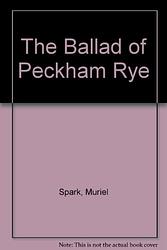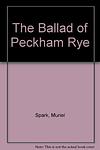The Ballad of Peckham Rye by Muriel Spark
This novel tells the story of a mysterious man who arrives in the London suburb of Peckham Rye and causes chaos in the community. He convinces a textile factory to hire him as a "human factor" consultant, where he begins to instigate rebellions among the workers, disrupts marriages, and causes general havoc. His actions lead to a death, a disappearance, and a wedding cancellation, leaving the community in disarray. The man's true identity and intentions remain a mystery, as the story explores themes of good and evil, reality and illusion, and the power of influence.
The 5922nd greatest book of all time
Ranking Details:
Our ranking system awards points to books based on their appearance and position on curated lists. Here's how it works:
Unranked Lists: For lists without specific rankings, each book receives points equivalent to the list's weight. This approach recognizes the book's inclusion on prestigious lists.
Ranked Lists: Books on ranked lists receive points in two ways:
- Base Points: Initially, every book is awarded points equal to the list's weight, acknowledging its significance.
- Bonus Points: Additionally, books earn bonus points based on their ranking. The total bonus pool, equal to 100% of the list's weight, is distributed among the books, with higher-ranked books receiving more points.
Exponential Distribution: The distribution of bonus points follows an exponential model. This means the top-ranked book (#1) receives significantly more bonus points than those further down the list (e.g., #100). Our algorithm ensures that higher placements are rewarded more generously, reflecting the achievement of a top rank on any given list.
This scoring system ensures that each book's ranking reflects both its presence on multiple lists and its positions within those lists, providing a comprehensive measure of its acclaim and popularity.
Total Points: 63
Since this book was first published in 1960, there is a penalty of 0%. The age adjusted score is 63.0.
This is to prevent newer books from reaching super high on the ranked list of the greatest books of all time. The greatest books should also stand the test of time.
- score: 63 -- 110 Best Books: The Perfect Library (Weight: 63)

